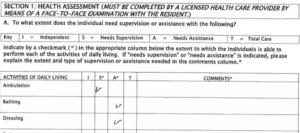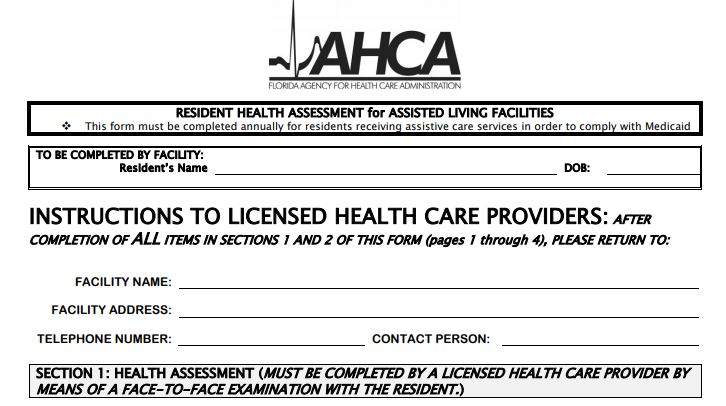The 1823 form determines a resident’s appropriateness for assisted living by an outside healthcare provider. These forms are usually created by the patient’s doctor and sent to the assisted living facility. If an 1823 form is not followed correctly, this is grounds for an Assisted Living Negligence Lawsuit.
What is an 1823 Form?
The 1823 form is a pre-made template given to providers by AHCA which addresses the resident’s care needs. The form must be completed by a licensed health care provider after a face-to-face exam of the patient. In the 1823 form, the health care provider assesses:
- Medical history and diagnoses
- Physical and sensory limitations
- Cognitive and behavioral status
- Nursing, treatment and service requirements
- Special precautions (like fall risk)
The 1823 form also determines who is to assist the resident with ADL’s, also known as activities of daily living. This form specifically dictates to the facility who is responsible for helping the resident walk, bathe, eat, dress, toilet, etc.

In many wrongful death cases we handle involving assisted living facilities, ALF’s try to run away from their duty to the resident. However, the 1823 form is an excellent tool to highlight the duties the ALF was responsible for relating to the resident.
Is an 1823 Form Required for Admission into a Florida Assisted Living Facility?
58A-5.0181 of the Florida Administrative Code, entitled Residency Criteria and Admission Procedures, determines admission criteria to Florida ALF’s.
Incoming residents must:
(a) Be at least 18 years of age.
(b) Be free from signs and symptoms of any communicable disease.
(c) Be able to perform the activities of daily living, with supervision or assistance if necessary.
(d) Be able to transfer, with assistance if necessary. The assistance of more than one person is permitted.
(e) Be capable of taking his/her own medication with assistance from staff if necessary.
(f) Not be a danger to self or others as determined by a physician.
(g) Not require licensed professional mental health treatment on a 24‑hour a day basis.
(h) Not be bedridden.
(i) Not have any stage 3 or 4 bed sores.
The relevant section 58A-5.0181(2), requires that an individual must undergo a face-to-face medical examination completed by a health care provider within 30-60 calendar days of admission.
What if an 1823 Form is Not Followed by the Assisted Living Facility?
Our lawyers have handled cases where facilities either ignored the care requirements in the 1823, or failed to have the form completed altogether. In both of these instances, we typically move for punitive damages, or punishment damages, as this failure is particularly egregious.
The 1823 is Only a Snapshot in Time…
Just because your loved one was determined to be appropriate for an ALF at the time of the 1823, this does not mean they can remain in assisted living forever. Most ALF residents suffer some form of confusion or dementia. This is a progressive disease that gets worse over time. Unfortunately, if the resident suffers falls or a decline in their condition, this may mean they are no longer appropriate for assisted living.
The Florida Administrative Code on Assisted Living Facilities states:
As part of the continued residency criteria, a resident must have a face-to-face medical examination by a health care provider at least every 3 years after the initial assessment, or after a significant change, whichever comes first. 58A-5.0181(4)
What is a ‘Significant Change’ in Condition?
A significant change is defined in Rule 58A-5.0131(32), F.A.C. as:
(32) “Significant Change” means a sudden or major shift in behavior or mood inconsistent with the resident’s diagnosis, or a deterioration in health status such as unplanned weight change, stroke, heart condition, enrollment in hospice, or stage 2, 3 or 4 pressure sore. Ordinary day-to-day fluctuations in functioning and behavior, a short-term illness such as a cold, or the gradual deterioration in the ability to carry out the activities of daily living that accompanies the aging process are not considered significant changes.
Repeated falls in the ALF is a major sign that the facility cannot handle the resident properly and represents a significant change in condition. If the facility fails to take action and re-assess appropriateness following major events like falls or wandering incidents, this too is a form of ALF negligence.
More Questions on Your Potential Assisted Living Facility Lawsuit?
Call our experienced and specialized Florida nursing home abuse lawyers today for your free consultation. We can help following injury or wrongful death in an assisted living facility. The call and the consultation is free so call us today – 1-844-253-8919.



